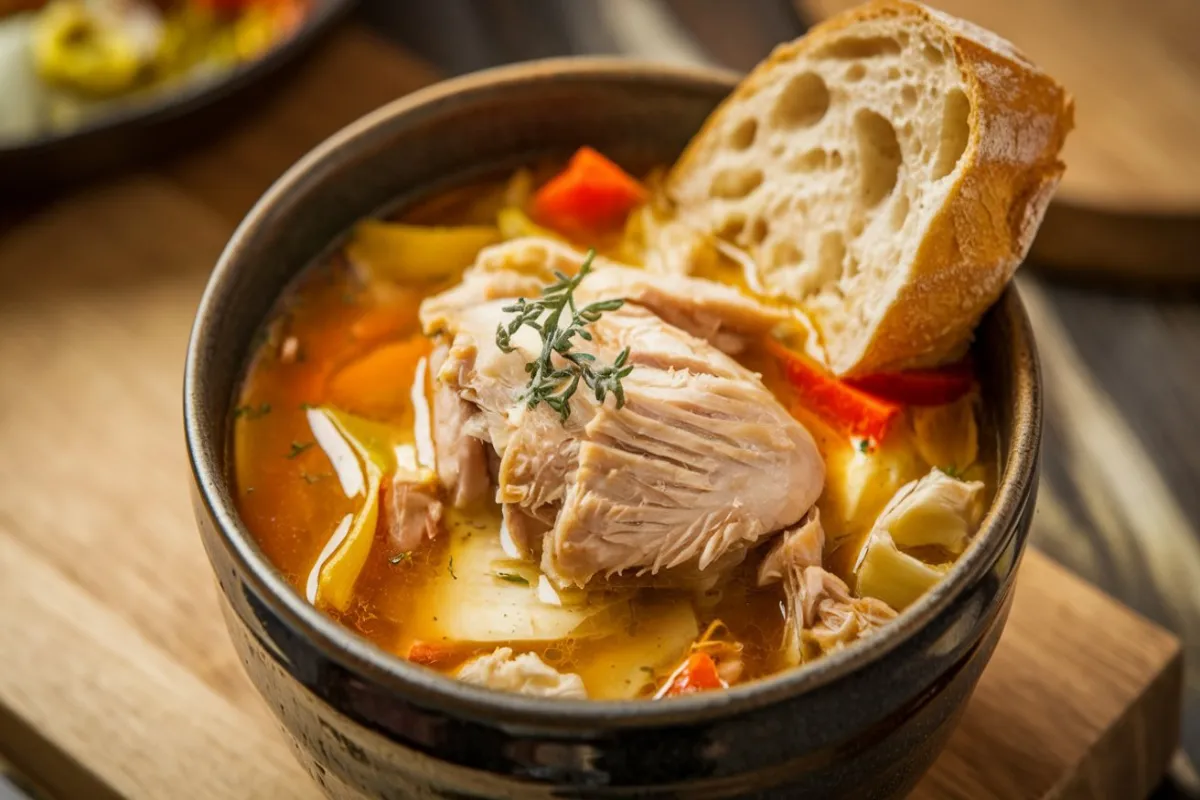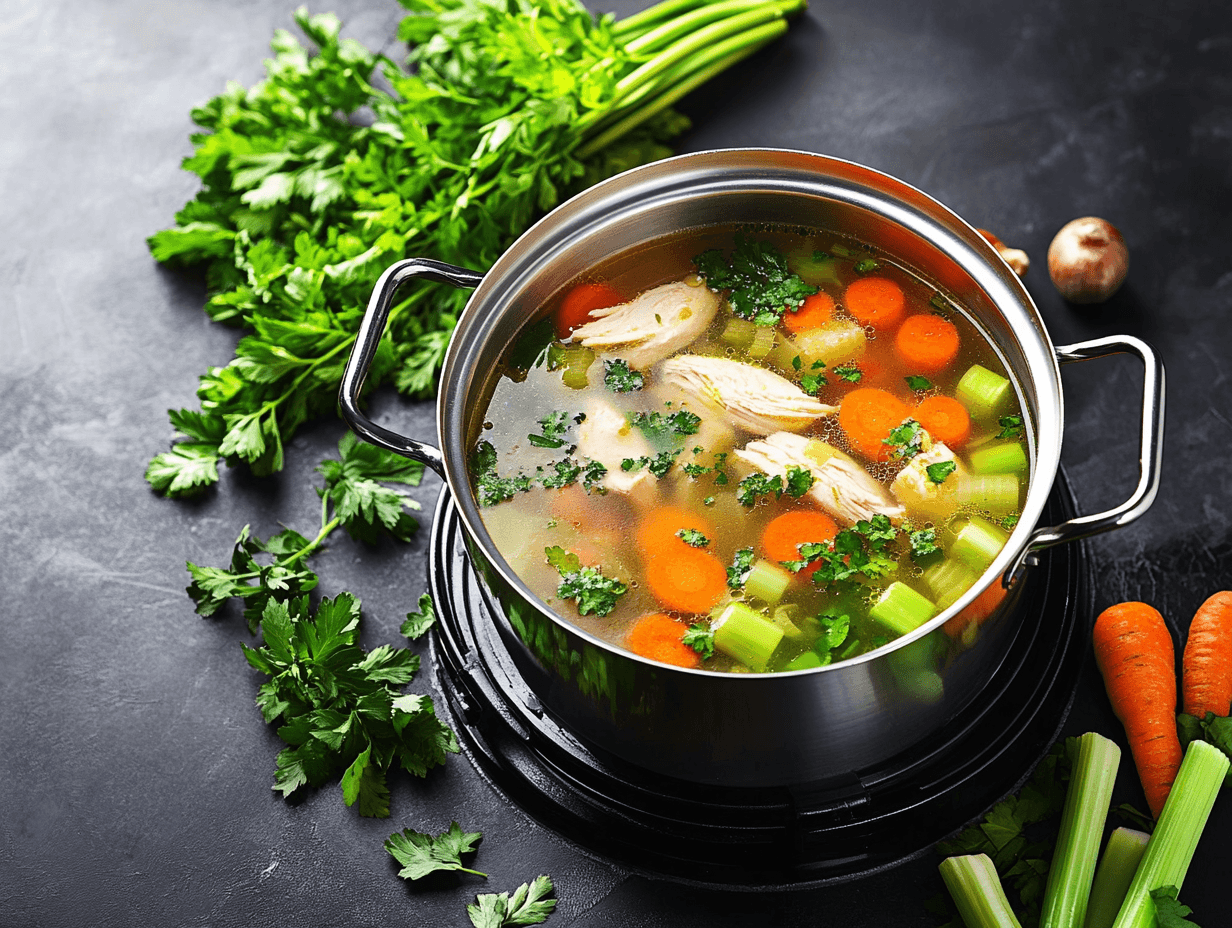Table of Contents
- Introduction: Using Leftover Rotisserie Chicken
- How Long Does Rotisserie Chicken Last in the Fridge?
- Is It Safe to Use a Week-Old Rotisserie Chicken in Soup?
- How to Tell If Your Rotisserie Chicken Has Gone Bad
- How to Properly Store Rotisserie Chicken for Soups
- How to Use Leftover Rotisserie Chicken Safely in Soups
- Best Practices for Using Leftover Chicken in Soup
- How Long Can You Store Chicken Soup Made from Leftovers?
- Frequently Asked Questions (FAQs)
- Conclusion: Enjoying Rotisserie Chicken Safely
Introduction: Using Leftover Rotisserie Chicken
Rotisserie chicken is a convenient and tasty option for busy households, often leaving leftovers that can be repurposed into other dishes, such as soups. However, the big question many people have is: “Can I use a week-old rotisserie chicken in soup?” Understanding food safety guidelines is crucial when using leftovers, especially cooked chicken, to prevent foodborne illnesses.
In this article, we’ll delve into how long rotisserie chicken lasts, signs that it may have gone bad, and best practices for using leftover chicken in soups. Making chicken soup with leftovers can be both delicious and economical, but only if done safely. Whether you have a few days-old chicken or are nearing the one-week mark, this guide will provide you with the information you need to make an informed decision.
How Long Does Rotisserie Chicken Last in the Fridge?
To determine if your rotisserie chicken is still safe to use in soup, it’s essential to understand how long cooked chicken remains fresh in the refrigerator. According to the USDA guidelines, cooked chicken, including rotisserie chicken, can be stored in the refrigerator for 3 to 4 days when kept at a temperature of 40°F (4°C) or below.
When storing rotisserie chicken, it’s important to use an airtight container or wrap it securely in plastic wrap or aluminum foil to prevent moisture loss and cross-contamination with other foods. Keeping the chicken in the coldest part of the fridge can also help extend its freshness.
Key Points to Remember:
- Shelf life: 3 to 4 days in the fridge.
- Storage method: Use airtight containers to keep moisture in and prevent contamination.
- Temperature: Ensure your fridge is set to 40°F (4°C) or lower.

Is It Safe to Use a Week-Old Rotisserie Chicken in Soup?
Using week-old rotisserie chicken in soup is generally not recommended. The USDA suggests that cooked chicken should only be stored in the refrigerator for 3 to 4 days. Beyond this timeframe, the risk of bacterial growth, including harmful pathogens like Salmonella and Listeria, increases significantly.
Even if the chicken looks and smells fine, it can harbor bacteria that may not be detectable to the senses. Consuming chicken that has been in the fridge for more than 4 days could lead to foodborne illness.
Why It’s Not Safe:
- Bacteria, such as Staphylococcus aureus, can grow on cooked chicken after several days, potentially causing food poisoning.
- Reheating chicken in soup does not necessarily kill all bacteria, especially if toxins have already been produced.
In summary, if your rotisserie chicken has been sitting in the fridge for more than 4 days, it’s safer to discard it rather than use it in soup or any other dish. When in doubt, it’s better to err on the side of caution and avoid the risk of foodborne illness.
How to Tell If Your Rotisserie Chicken Has Gone Bad
Before using leftover rotisserie chicken in soup, it’s important to check for signs of spoilage. Here are some key indicators that your chicken has gone bad and should not be used:
1. Off Odor
One of the most noticeable signs that rotisserie chicken has spoiled is an unpleasant odor. Fresh cooked chicken should have a neutral smell. If you detect a sour, sulfur-like, or otherwise foul odor, it’s best to throw the chicken away.
2. Change in Texture
If the chicken feels slimy or sticky to the touch, it has likely begun to spoil. Fresh chicken should have a firm, moist texture, not a slimy one.
3. Discoloration
Rotisserie chicken should be white with a golden-brown skin. If you see grayish or greenish spots, this indicates mold or bacterial growth, and the chicken should not be consumed.
4. Taste Test (With Caution)
If you’re uncertain, a small taste test can help. However, this should be done with extreme caution and is not generally recommended for week-old chicken. If the chicken tastes off or sour, spit it out and discard the rest.

How to Properly Store Rotisserie Chicken for Soups
Proper storage is key to extending the life of your rotisserie chicken and ensuring it’s safe for later use in soups. Here’s how to store your chicken effectively:
- Refrigerate Promptly: After purchasing or cooking the chicken, refrigerate it within 2 hours to prevent bacteria from multiplying.
- Use Airtight Containers: Place the chicken in airtight containers or wrap it tightly in plastic wrap or aluminum foil. This helps retain moisture and prevents it from absorbing odors from other foods.
- Divide into Portions: If you plan on using the chicken for different meals, divide it into portions before storing. This makes it easier to use just the amount you need without exposing the rest to air each time you open the container.
By following these storage methods, you can keep your rotisserie chicken fresh for up to 4 days in the fridge.
How to Use Leftover Rotisserie Chicken Safely in Soups
If your rotisserie chicken is still within the 3-4 day window, it can be safely used in soups. Here’s how to incorporate leftover chicken into your soup recipes while ensuring food safety:
- Shred or Cut the Chicken: Remove the chicken from the fridge and shred or chop it into bite-sized pieces. This makes it easier to incorporate into the soup and ensures even reheating.
- Add at the End: Since the chicken is already cooked, add it to the soup towards the end of the cooking process. This prevents the chicken from becoming overcooked and helps retain its moisture and flavor.
- Reheat Thoroughly: Make sure that the soup reaches an internal temperature of 165°F (74°C) to ensure that any bacteria present are killed. Using a food thermometer is the best way to ensure the soup is heated to a safe temperature.
By following these steps, you can safely enjoy leftover rotisserie chicken in your soups, adding a rich and flavorful protein boost to your meal.
Best Practices for Using Leftover Chicken in Soup
Using leftover chicken in soup is a great way to minimize waste and create a hearty, delicious meal. However, following best practices is key to ensuring the chicken remains safe to eat:
1. Use Fresh Ingredients
When making soup with leftover chicken, use fresh vegetables, broth, and seasonings. This not only enhances the flavor of the soup but also reduces the risk of contamination from spoiled ingredients.
2. Don’t Overcook
Since the chicken is already cooked, add it to the soup towards the end of the cooking process. Overcooking can make the chicken tough and dry. By adding it in the last few minutes, you ensure that it stays tender and moist.
3. Store Soup Properly
If you have leftovers, store the soup in an airtight container in the refrigerator. Chicken soup can be safely stored for 3 to 4 days. If you plan on keeping it longer, consider freezing the soup in portions for future meals.
4. Freeze If Unsure
If you’re unsure about using the chicken within 4 days, freeze it earlier to extend its shelf life. Frozen chicken can last up to 3 months, and it can be thawed and used in soups at a later time.

How Long Can You Store Chicken Soup Made from Leftovers?
Chicken soup made from leftovers can be stored in the refrigerator for 3 to 4 days. To store it properly:
- Cool the Soup: Before placing it in the fridge, allow the soup to cool to room temperature. This prevents condensation from forming inside the container, which could dilute the soup and promote bacterial growth.
- Use Airtight Containers: Store the soup in airtight containers to keep it fresh and prevent it from absorbing odors from other foods in the fridge.
- Freeze for Longer Storage: If you don’t plan on consuming the soup within 4 days, freeze it. Use freezer-safe containers or resealable bags, leaving some space for the soup to expand as it freezes.
Frequently Asked Questions (FAQs)
1. Can I eat chicken that has been in the fridge for a week?
No, it’s not recommended to eat chicken that has been refrigerated for more than 4 days. The risk of bacterial growth increases significantly after this timeframe, potentially leading to foodborne illness.
2. How can I tell if my rotisserie chicken has gone bad?
Signs of spoilage include a sour or unpleasant odor, slimy texture, and discoloration. If the chicken shows any of these signs, it should be discarded.
3. Does boiling the chicken in soup make it safe to eat?
Boiling can kill most bacteria, but it may not remove toxins produced by some bacteria that have grown on the chicken if it has already gone bad. It’s best to use chicken that has been stored properly and within the safe timeframe.
4. How long can I keep chicken soup in the freezer?
Chicken soup can be stored in the freezer for up to 3 months. Be sure to use freezer-safe containers and label them with the date of freezing.
5. Can I add vegetables that have been stored for a week to my soup?
It depends on the condition of the vegetables. If they show no signs of spoilage, such as mold or an off odor, they can be used. However, using fresh vegetables is recommended for the best flavor and food safety.
Conclusion: Enjoying Rotisserie Chicken Safely
Rotisserie chicken is a versatile ingredient that can be used in many dishes, including soups. However, safety should always come first. Using chicken that has been stored for no more than 3 to 4 days ensures that you’re not taking unnecessary risks with your health.
If your chicken has passed the 4-day mark, it’s safer to discard it rather than trying to use it in soup or other dishes. While making use of leftovers is a great way to minimize waste, food safety is always the priority.
By properly storing rotisserie chicken, using fresh ingredients in your soups, and following food safety guidelines, you can enjoy delicious and nutritious meals without worry.

